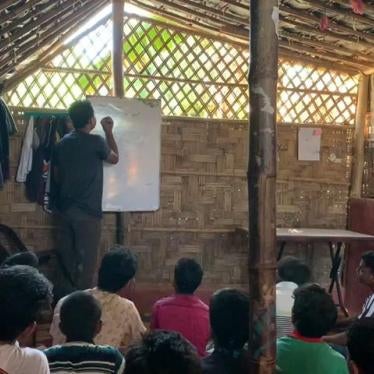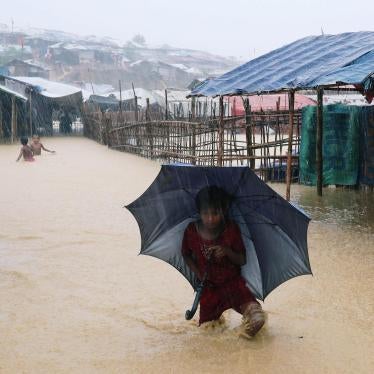(New York) - As leaders of the Association of Southeast Asian Nations (ASEAN) meet at the Thai beach resort of Hua Hin this week, recent events on other Asian coastlines presents a challenge to the grouping. The plight of the ethnic Rohingya Muslim minority from Burma was revealed when several boats containing hundreds of exhausted men arrived on Thai, Indian, and Indonesian shores in January.
Human rights groups accused Thailand of sending boats laden with Rohingyas back to international waters after they landed in southern Thailand. Prime Minister Abhisit Vejjajiva first denied the charges, then tried to cover up the allegations, and now accuses the international media of distorting footage of the Thai navy towing the rickety boats back to sea.
Meanwhile boats with hundreds of Rohingya, weak and dehydrated and describing abuse by the Thai military, landed in Indonesia and India. Jakarta initially threatened to return the men to Burma, but has since permitted the UN refugee agency to assess their claims for refugee status.
Asean members will discuss these events during this week's summit meeting, recognizing that the issue and its potential solution are 'regional.' Burma will undoubtedly claim that the issue has nothing to do with Asean and that Burma cannot be held to account because the Rohingya are not Burmese citizens.
Rohingyas sail from western Burma and southeastern Bangladesh every year fleeing persecution from the Burmese military. Several thousand arrive in Thailand annually, in transit to Malaysia, where more than 50,000 have made their home, living and working illegally since Malaysian immigration law does not recognize refugees.
About 250,000 earlier fled to Bangladesh, about 30,000 of them living in squalid refugee camps, and half a million are working illegally in the Middle East. Fewer than a million remain in Burma.
The semantics of whether the Rohingya are economic migrants, asylum seekers or refugees is the crux of Asean adopting a lasting policy response that will solve the issue.
In Burma's horrific hierarchy of human rights violations, the Rohingya have the unenviable distinction of being the most blighted. Denied citizenship, subject to tight restrictions on movement, employment and religious freedoms, this minority have been the target of abuses by the Burmese military for decades. Two major "ethnic cleansing" campaigns against the Rohingya, in 1978 and 1991, sent hundreds of thousands fleeing into Bangladesh. Today they face serious risks of state violence and coercion, in part arising from preparations to build a pipeline through their region that will deliver offshore gas to China. Already reports are emerging of forced relocations and other abuses tied to gas exploitation.
The United Nations staged a "return" program for the Rohingya from Bangladesh to Burma from the mid-1990s, but it proved to be a disaster. International aid agencies in western Burma have kept hundreds of thousands alive while Burma's military government continues to persecute them. This miserable existence explains why some flee in boats to other Southeast Asian countries.
Recognizing these people as refugees is only the first step. To stem the flow, Asean has to address Burma's dreadful rights record and to insist that it put an end to the abuses that cause people to flee. Asean has always been reluctant to do so, prioritizing its cherished principle of "non-interference" in the internal affairs of member states as an excuse to mute criticism of human rights violations.
Asean has a fledgling human rights mechanism it should use to protect people like the Rohingya, in line with international standards. The Asean Charter, which came into force in December, commits member states to protect human rights. At the summit, foreign ministers will discuss the mandate for the Asean human rights body to be created to carry out this commitment. There are well-grounded concerns that the terms they set will be too weak to improve human rights protection in the region.
A significant step would be for all Asean members to ratify the UN's 1951 Refugees Convention without delay. Only two Asean countries have ratified it, which is disgraceful in a region with a long history of refugee flows caused by wars and abusive governance practices.
The tragedy surrounding the Rohingya's perilous exodus is just the tip of Asean's failure to address the dire state of human rights in Burma. This weekend's summit will provide Asean with an opportunity for real progress. If Asean leaders cannot adequately resolve the Rohingya issue, then their human rights body may just be another leaky boat.
Elaine Pearson is deputy Asia director for Human Rights Watch.








